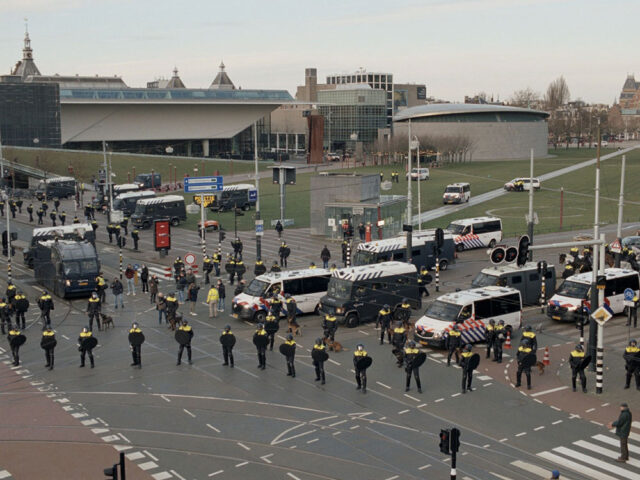
The post Occupied City: McQueen and Country, by Scott Nye appeared first on Battleship Pretension.
In his historical dramas – Hunger, 12 Years a Slave, and the five films he made under the Small Axe anthology banner – director Steve McQueen has routinely created close ties between the past and the present, between the motivations and circumstances of his subjects and the time in which those films were released. His latest, and his first feature documentary, is the most direct in that pursuit, and even amidst a career tackling difficult subject matter, resolutely his most demanding. Occupied City is a four-and-a-half-hour film with a single approach – show streets and buildings in Amsterdam as they exist today, and tell us what happened there between 1940 and 1945.
Based on an illustrated book by Bianca Stigter, McQueen’s wife and sometimes producer, the film is rigorous and revealing; exhaustive and exhausting. Narrated by Melanie Hyams with a surprisingly-cheerful sense of discovery, the film holds the weight of the past against the chaos of the present and hope for the future. As we travel block by block through the city, recalling the innumerable tragedies the Nazis perpetrated against its residents, one is perhaps most immediately struck by the progress that’s been made since then. Amsterdam is a lively, bustling, yet often pleasant city, a nice place to raise a family and largely representative of a contemporary European democracy.
Inevitably, in this day and age, McQueen encounters protests – against mask and vaccine mandates, against the rising tide of fascism worldwide, supporting women’s reproductive rights…Amsterdam is 3600 miles from our own eastern seaboard, but the particular struggles of the day are not so distinct between the two countries. Trump is even mentioned by name in their protests. Rather than draw any particular association between the two – who are the real Nazis of today and so on – the clearest impression I got from the juxtaposition is that despite our historical knowledge of combined western forces triumphing over dictatorship, we’re still wrestling very actively over what exactly society looks like, and what form our resulting democracies will take. We understand more intuitively these days how fragile the post-World War II world order is, and that our contemporary battles for our national souls look very different from how they did then.
McQueen’s rigor, reinforced by Lennert Hillege’s cinematography and Xander Nijsten’s editing, over the film’s vast running time (the DCP has a built-in fifteen-minute intermission about halfway through, so worry not there) makes it impossible not to zone out during the occasional section, only to snap back into focus by either self-determination or a particularly curious story. The sheer vastness of the terror is staggering, too much to fully absorb sitting with it all the way through, and McQueen is smart with how he lets viewers fall into various stages of attentiveness only to snap them back into focus. Most memorably, and surprisingly playfully, Hyams relays an anecdote about someone collapsing in the wartime era at the precise moment we see someone fall off a bicycle in the present. We’ve become so accustomed to parsing the parallels objectively that the visceral association is electrifying.
Before making films in the mainstream, McQueen was a short filmmaker whose work most often played in museum galleries, those weird little rooms you’ll hear noise from and walk into some strange 11-minute piece midway through. Occupied City feels like the most direct extension of that work, the kind of thing that plays very well all the way through but which one could easily duck in and out of and glean a great deal of meaning from, the way one might flip through Stigter’s book for familiar addresses and locations, only to be drawn in by the work itself. In a time when the meaning and purpose of “the theatrical experience” is constantly being revisited, revised, contradicted, and expanded, Occupied City is a new sort of confrontation to it. It’s very well worth welcoming and digesting.
The post Occupied City: McQueen and Country, by Scott Nye first appeared on Battleship Pretension.
The post Occupied City: McQueen and Country, by Scott Nye appeared first on Battleship Pretension.




